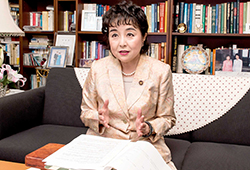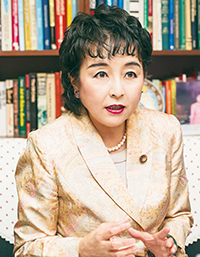
The role of women in society is an issue for Japan and many other countries. Prime Minister Shinzo Abe highlighted this point during his speeches to the United Nations in 2013 and 2014, and received much applause from the UN General Assembly. This indicates that promoting the role of women is an important message that the world wants to hear from Japan. As one of the leading developed countries in the world, Japan has a responsibility to promote an international community that supports the activities of women around the world and is focused on their roles and happiness. We spoke with Kuniko Inoguchi, the Acting Chairperson of the Party's Headquarters for the Promotion of Women in Society and Japan's first Minister of State for Measures for Declining Birthrate and Minister of State for Gender Equality.
Q: A greater role for women in society is one of the pillars of the growth strategy, and there are increasing expectations regarding what this will achieve.
Acting Chairperson of the Headquarters for the Promotion of Women in Society Inoguchi: Prime Minister Abe's speech to the UN General Assembly was moving. After it was over, representatives from UN agencies rushed over to shake his hand. I visited the UN General Assembly hall many times when I was Ambassador to the Conference on Disarmament, but I didn't encounter such a scene so often. Japanese women and the public in general are naturally grateful that Prime Minister Abe has "mainstreamed" the support of women and taken up the issue head-on at the United Nations, and we should be aware of the acclaim that this has received from countries around the world that are trying to deal with this topic.
The Party's Headquarters for the Promotion of Women in Society (Chairperson: Policy Research Council Chairperson Tomomi Inada) wants to work hand-in-hand with the government to strengthen these efforts. We have launched three project teams, each of which has formulated "recommendations" for submission to relevant ministers.
Q: You head the "project team on the role of women in diplomacy and international contributions," and your recommendations focus on expanding educational opportunities for girls.
Inoguchi: There is greater awareness of this issue thanks, in part, to the efforts of First Lady Akie Abe to highlight it. Great progress has been made under the United Nations MDGs (Millennium Development Goals) in the enrollment of girls in elementary schools, but large numbers leave school around puberty because some countries do not provide gender-specific toilets and the girls consider it dangerous to remain. One of our recommendations is that girls' toilets be installed in all elementary schools.
Next, increasing the literacy rate among mothers is crucial to reducing infant mortality. They need to have access to information that will save infants and toddlers from illness and starvation.
We also recommend the spread of the Japanese school lunch system. I think we need to highlight to the world the importance of children, especially from poor families, receiving at least one highly nutritious meal a day.
Other recommendations include the promotion of athletic education for women, which in Europe and North America has served as an opportunity to promote gender equality, the spread of Japanese-style maternity health record books, which have been effective as a tool in recording children's development, and support for the Vaccine Alliance to help save children from preventable diseases.

Q: The recommendations also highlight the importance of the perspectives of women in disaster prevention and response.
Inoguchi: The World Conference on Disaster Risk Reduction held in Sendai in March of this year was a great success, and it was one of the largest international conferences that Japan has ever hosted. There is great interest around the world in Japan's disaster-prevention expertise. Under the leadership of LDP General Council Chairperson Toshihiro Nikai, Japan has declared November 5 to be "Tsunami Disaster Prevention Day," and we will also submit a resolution to the autumn United Nations General Assembly session that the United Nations declares to make the day the "World Tsunami Day." We hope to see this adopted unanimously or with an overwhelming majority.
In both the Great East Japan Earthquake and the earlier Haiti Earthquake, the female mortality rate was higher in all age groups. As I wrote in my academic paper submitted to the Science Council of Japan, mothers and female children were the first to come down from high ground and start to clean up after the earthquake, and it was then that they became victims of the tsunami. Having a day on which the entire world recognizes the potential damage from the tsunami will go a long way to spreading our insights and knowledge about preventing disasters, including the perspectives of women.
Q: You also made recommendations about reforming work styles and leave styles, and about protecting the rights of women.
Inoguchi: These recommendations were the result of the leadership displayed by Chairperson Inada, and it was a privilege for me to serve as Acting Chairperson. The Party's Diet members, both men and women, were enthusiastic participants in the process, and it seems to me as if these efforts are the dawning of a new day.
Going forward, we will submit the recommendations to the government and follow up on their implementation. From my experience as a former minister responsible for declining birthrate and gender equality, I understand that major changes in society cannot be achieved over the short term but will require concerted mid and long-term efforts. The LDP needs to continue to earn the trust of the Japanese people and remain in power so we can ensure that what we have recommended is actually achieved.
We are also considering the production of an "English version" of the recommendations. We think the recommendations will be effective for other countries as well, and given the high regard for Prime Minister Abe's speeches, we believe this is a topic on which we should take the lead in the international community.










